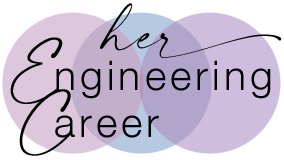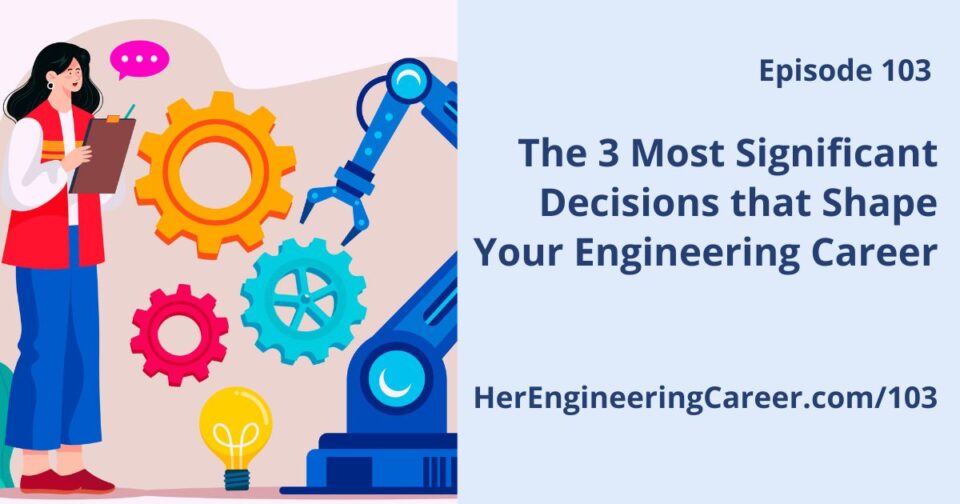Episode Transcript
Your goal is to be comfortable in your engineering career. And you can certainly achieve that. But if that’s as far as you go, you won’t make a significant contribution.
And you’re certainly not gonna reach your potential.
And while, yes, you’ll be comfortable, you won’t be very fulfilled. Because making an impact is what makes your engineering career fulfilling.
And making an impact means getting out of your comfort zone.
Early in my career, one of my goals was to get comfortable with engineering work. At that time it was a necessity for me.
This type of career was foreign. I had so much to learn. So much to get used to. I just wanted to reach a level of comfort.
I’m hoping engineering isn’t as foreign to women as it used to be. And that comfort is not your main goal. Or if it is, that you can get past it quicker than I did.
Because you wanna be moving on to some key decisions that launch your career toward your vision. That launch you on a trajectory of career fulfillment and success.
The Secret Code to Career Security for Women Engineers
There’s a way you can more confidently face key career decisions. A perspective that gives you the courage to choose the more impactful path. The one that gives you more fulfillment.
Here’s the trick.
You have a set of values, skills, strengths and passions. I call it your energetic center. (Like we’ve talked about in Episode 22 and many times since.) You know these aspects of yourself.
Package up your energetic center. See it as your secret code. And take it with you to unlock whatever role you choose to take on.
This is important because it teaches you to hold yourself in highest esteem. Not your job or the technology or the organization.
The job can be de-funded or taken away. The technology will evolve. The organization may fail. But you and your energetic center live on. You are what’s most valuable here.
You can take your secret code anywhere you want and be successful. It’s a built-in resilience. Not job security, but career security.
Keep this trick in mind as you face the key decisions in your engineering career. It will help you thrive in a career that aligns with you.
3 Key Decision Types for Step-Function Changes in Your Engineering Career
There are lots of decisions you’ll face in your engineering career. But I wanna point out 3 questions that lead you to decisions that are especially significant.
Significant because they can cause step-function changes in your career progress.
- Where Should I Pivot?
This first decision type is about pivoting. A career pivot is a change in direction.
It’s more of a horizontal change than a vertical one. But it enables you to learn new skills as well as use your existing skills in a different way.
Pivots are a way of shaking things up in your career. Instead of just following along the same path forever, you can move to a different technology or product line or engineering role.
Whether or not to move from the technical track to the management track is another good example of a pivot decision.
Pivots are beneficial to your career. They broaden your skills and experience, which serves you well for future promotions.
And they tend to coincide with bigger pay increases. Because a “shift” tends to pay more than an incremental step.
You’re not obligated to stick with work that lines up with your previous job experience. It’s okay to take a risk. Make a pivot. Follow your skills and talents, not just the technology.
If there are a couple pivots in your career, you’ll likely get closer to your vision sooner.
- Where Can I Leap?
Career leaps are the second decision type. This is another way to disrupt incremental progress in your engineering career.
As opposed to career pivots, leaps are more vertical than horizontal. To take a career leap, look for positions that stretch you more. Skip a step, if you will.
Go for more challenging roles even when you don’t meet very many of the qualifications.
Another way to leap is to create your own position. Define a role for yourself based on your energetic center and what you want to do with that role.
Then advocate for yourself and negotiate with the relevant leaders.
- Who Are My Allies?
The third decision type has to do with networking and influential relationships.
Deciding who your allies are, who you’ll listen to, makes a huge difference in how far you move along your career trajectory.
Fill your network with all kinds of connections. But also be strategic.
Seek out people who understand your strengths. Who understand your potential and vision. People who have influence and power. And people you can trust.
Then help those people help you by communicating your career message and sharing how you want to make a contribution.
Whether or not you get the opportunities you want is largely dependent on people. So deciding who your allies are is critical.
Choose Growth Over Comfort in Your Engineering Career
These are the types of decisions that will get you places in your engineering career. They’re not comfortable decisions. And that’s a good thing.
It’s what tells you you’re succeeding in getting outside your box.
You’re succeeding in making significant progress toward your vision. Toward the fulfilling career you seek. And toward the engineer you want to be.
If you’re looking to make step-function changes in your engineering career, consider working with me through my signature program.
Find out more and fill out an application here. I’d love to help you with the significant decisions that make up your career strategy.
Next time on Her Engineering Career Podcast we’ll explore the idea of legacy. What will be your engineering career legacy? Be sure to tune in for Episode 104.

